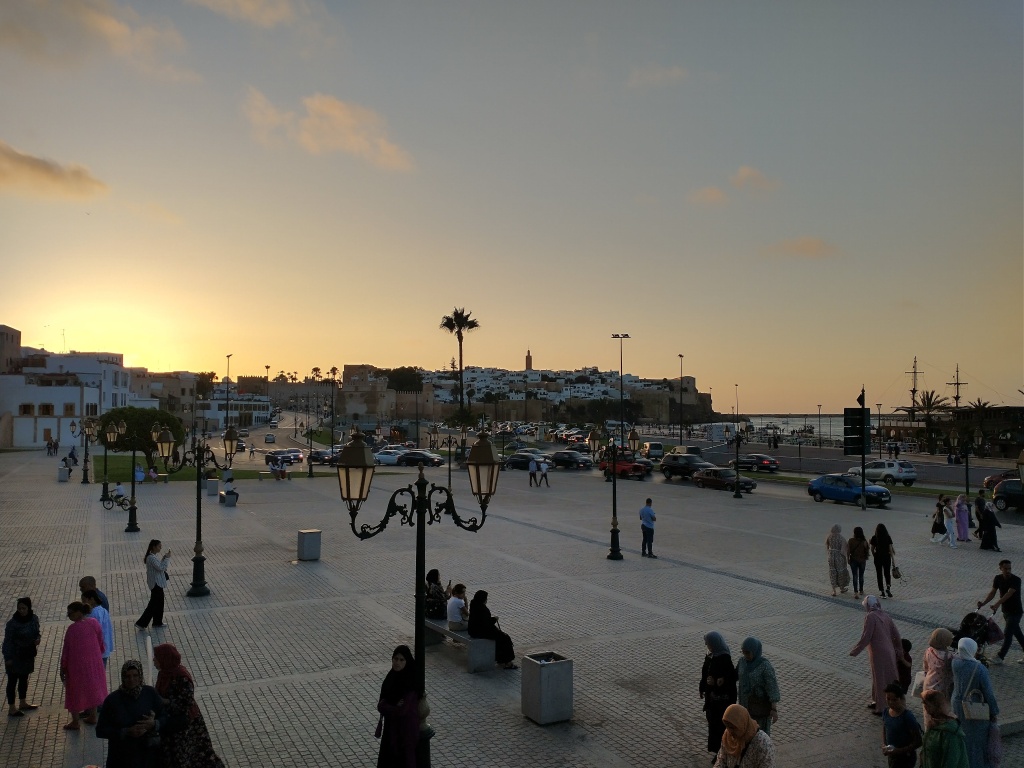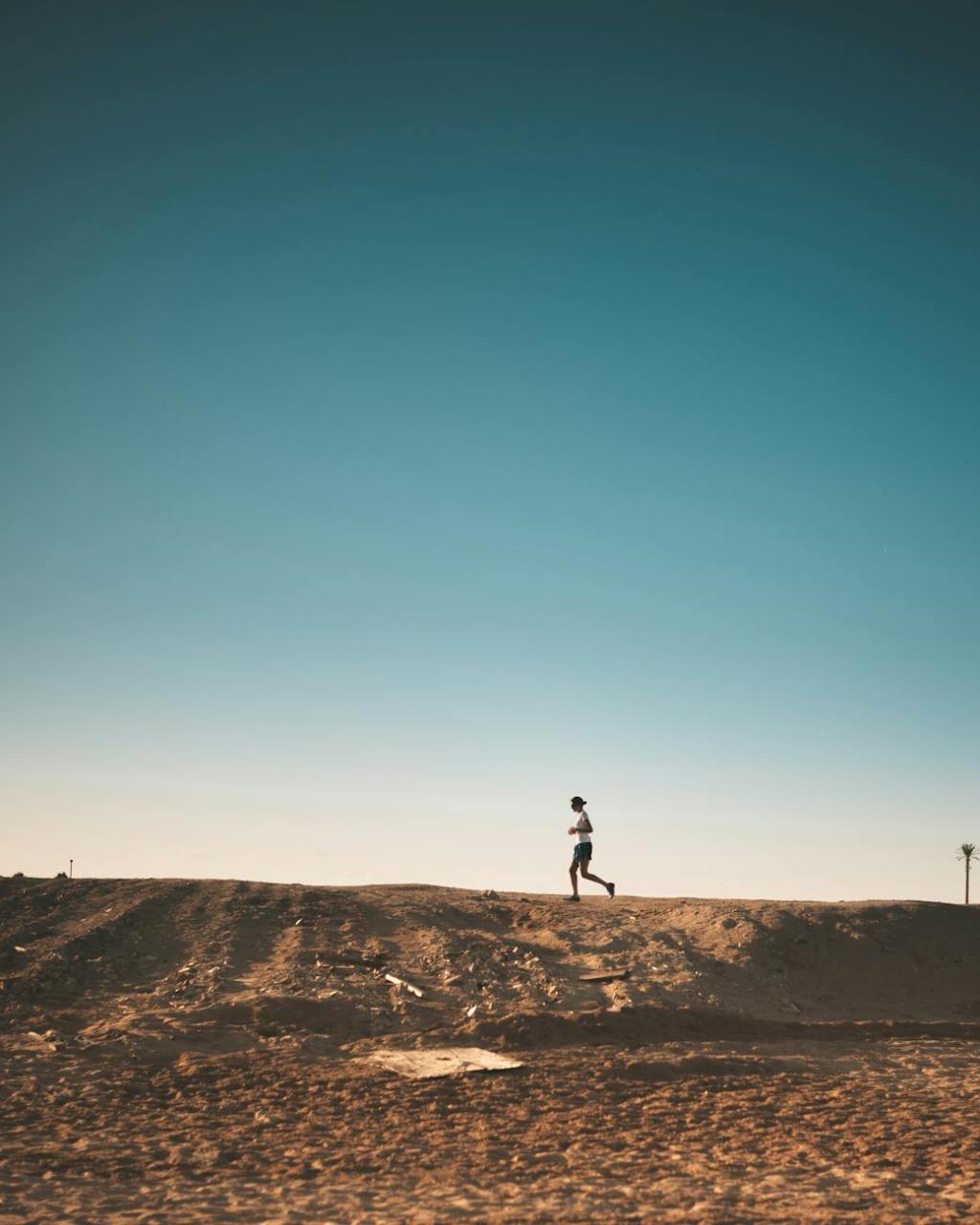Note: This short piece sidesteps the chronology of my present journey and profiles a Moroccan man I met two and a half months ago at the start of the trip.
We are all broken records to some degree. We hitch our carts to ideas we identify with and repeat them to each other, ad nauseum. I tell myself countless mini-stories about the “truths” I’ve found in life, and I navigate the alleys of confirmation bias to cling to these little nuggets. Some change over time, depending on life’s evolving context, but a few of these whoppers have real mass and staying power. Out here, as I bumble around the African Magreb and South Asia, I’ve repeated the phrase “travel is my classroom” like a well-worn mantra—and it feels true. I find history captivating and architecture elicits my marvel. Nature supercharges every square inch of my being. But what moves me—what really moves me—are people. Individuals with unique vantage points deposit the loudest echos in my mind, and North Africa has no shortage of these characters.
Meet Walid, a 35-year-old Moroccan man who teaches Arabic by day and hosts an Airbnb by night. His three-bedroom apartment is situated in Rabat’s historic Hassan Quarter, just steps from a tidy downtown and east of the bustling medina. It offers respite from the busy summer nights where Moroccan life churns at local cafes until well past midnight.
We first met as I walked the wide steps of his apartment building and arrived on his 3rd floor doorstep. He welcomed me with a gentle smile and invited me to drop my bag. I untied my boots and took the ratty hotel slippers he pushed into my hand. 16 hours of flying, two trains, and carrying a 30-pound duffel through the early July heat left me ready to plop on any soft surface I could find.
His black hair stood high and wild, and his puffy eyes suggested a groggy innocence, as if he’d just climbed out of bed. We toured the apartment, shuffling from room to room, while he pointed out the kitchen, the veranda, and two side-by-side bathrooms. We then entered a well-lit room where I’d be staying, with a neatly made queen bed and a private balcony overlooking the street. I tossed my hat and phone onto the mattress, feeling a few ounces lighter and grateful to have shed the weight.
The living room was filled with plants, books, and a wrap-around sofa situated below a large open window. As we stood in the room, two brown birds zipped through the opening and perched along the ridge of a sofa cushion. We laughed at their indifference to property boundaries and left them alone to explore.
The opposite wall held stunning black-and-white photos arranged by a sharp, decorative eye. Each image was offset, yet proportional, with small plants mounted between every frame to accent the positioning. The dust of decades had given the photos a strong patina—like the vinyl crackle on a weathered record—and told stories of their previous lives before landing on this wall. I gestured toward the pictures, asking for a story. His thin fingers carved a path through the air from image to image, attaching names to faces.
“This is Franz Kafka. And this one is Jean-Paul Satre. And here is Friedrich Nietzsche, and that’s Fyodor Dostoevsky,” he said.
“You read philosophy?” I asked.
“Yes, I love these writers. They’re all incredible,” he shared.
“Is that Camus?” I asked, walking towards a photo in the hallway.
“Yes! He is my favorite. You know Albert Camus?”
“I was a philosophy major in college,” I said. “Camus was a trip. A real celebrity, a brilliant thinker, French-Algerian, if I recall. The Myth of Sisyphus—have you read it?”
“Yes, of course. I love this piece,” he said, placing his right hand over his heart. “It’s so close to what our lives are really like, in my opinion. It’s the story of humanity.”
“You think so?” I asked.
“Yes, the struggle for meaning in a meaningless world.”
“I agree,” I said. “Portions of that essay still guide me now. Imagine Sisyphus smiling as he rolls the boulder of futility.”
“Exactly!” he said. “Would you like some tea?”
“Yes, I’d love some,” I said. “No sugar, please.”
While he was in the kitchen, I sat down and opened my duffle bag. I pulled out my notebook and pen, scribbling “Write about Camus” along the thin margin of the page.
I’d asked Walid for an Arabic lesson while we sipped atay (Moroccan mint tea) from thin pear-shaped glasses around the dining room table. He agreed and we planned an evening coffee session for the following day. I spent the remainder of the afternoon hiding from the midday heat and the evening wandering the winding arteries of the nearby souk. Hawking merchants sold dried fruits and exotic spices to the locals while I slipped through the crowd, enjoying fragrances like cardamom and rose water wafting from nearby stalls.
The heat of the night stole any chance for sleep. It was 3:00 a.m. when I woke in a tangle of damp sheets, with my torso covered in clammy sweat. I walked to the balcony and stood shirtless in the warm summer air. The ghosts of doubt—common visitors to the early morning mind—bombarded me with questions about my decision to uproot my life for the next 90 days. To leave home for months on end at 20 years old and wander Europe seemed reasonable. And to do it again at 24 through Asia seemed wise too. At 28, I managed to justify a “round-the-world trip” in search of a career change. But at 41, it felt like some radical upheaval of life to be gone this long. I’d left behind a partner I love, a beautiful dog that was slowly growing sick, and a community of people I consider my tribe. I’d miss a large family gathering at our cabin in the woods—a patch of earth our family clings to like promised ancestral land. And I risked something happening to me on the seasonal eve of my best friend’s wedding by traveling through touchy, developing nations, many of which are navigating seminal moments of internal strife. Was I passing a common brand of selfishness off as cultural curiosity in an attempt to fool myself? What is this goddamn magnetic attraction to thorny pockets of the world that I can’t seem to shake? I sat down, grabbed my notebook, and wrote the date and time at the top of the page. I brought the tip of the pen to the surface of the paper and waited for ideas to flow, hoping to scribble something—anything that would help me find an answer. ‘Write about Camus’ was scrawled along the margin. But nothing rose to the surface except the loud sounds of silence.
I scorned the morning as the sun fought through the curtains and found my face. I rolled to the opposite shoulder and checked my watch. It was 9:00 a.m., and the day was not planning to wait for me. I washed up, grabbed my writing gear and went in search of a cafe. The sun baked the pavement below my feet and a cream-colored awning of a nearby salon promised strong coffee and respite from its rays. I settled in and ordered an espresso. The men around me stared down at their phones as if the world around them had been sucked into their screens. My travel life began 20 years earlier, a time when bistro tables held street spectators and judicious observers. Now, it was a world full of scrollers and thumb-flickers, with eyes raised only to light a cigarette or gesturing for a refill. Time had somehow evaporated like the clearing of morning dew—20 years of time, to be exact—somehow gone in a flash, as if I’d taken a long nap. I thought about Sysiphus rolling his boulder.
Walid and I convened later that evening and walked to a nearby coffee shop. Along the way, he dipped into a corner store and emerged with two packets of seeds.
“Here, try these. Moroccans love seeds,” he said as he handed me a packet. I tucked the sachet under my notebook as we walked and took in the colors of the neighborhood. A plastic bag of tomatoes swung in the hand of an elderly gentleman. Bundles of fresh mint rested on a nearby countertop, waiting to be dropped into a glass. When we arrived at the Casa di Carta, we found a table under the veranda and ordered two ness, ness coffees (half coffee, half milk—Moroccan style).
Over an hour-long Arabic session, Walid sipped from the rim of his cup and pulled drags from his Monte Carlo cigarettes while I labored through guttural sounds for “KH” and pronunciations of “GH” (a rolling “r” with a throaty sound).
“What an absolute mess I am at this,” I said.
“No, no, you’re doing great!” He smiled as plumes of smoke poured from his nostrils.
I stumbled over consonants and treated every combination like an English diphthong. 45 minutes into the lesson, I threw in the towel and derailed our progress.
“Tell me about your perspective on America,” I said. “Well, what I’m asking is the general Moroccan perspective on America.” It was a huge question and I knew it. But our shared interest in philosophy gave us a bridge to a deeper conversation, and through some earlier chitchat, I sensed his inclination to play mental checkers with me rather than chess. Would he chop at the knees of Uncle Sam like I’ve previously experienced in other parts of the world?
He sat forward, sipped his coffee, and immediately asked if my question was about America, the nation, or Americans as people. “Start with America,” I said, but as I failed to record the conversation, I’m unable to directly quote him any further with credible accuracy, barring a few short responses. I do, however, recall his general thesis and the wellspring of nuanced clarity that fell from his lips.
He recited the well-known points of America’s national ideals: land of opportunity, extreme power with immense foreign influence, comparative affluence, etc. But he homed in on two ideas and focused on their importance as the framework for a truly open state: the ability to speak freely and confidently without repercussions from the government, specific to speech that committed no crimes—and feeling capable of casting your own lot in life. To most Americans, these are gospel truths. But for Moroccans, both family and societal expectations, often set forth by a rote education system, require most students to follow a path they may not have chosen for themselves, and for many, the channels they are forced to enter feel stifling.
He paused when I mentioned the phrase “speaking truth to power,” and I watched as his eyes floated toward some distant glare. He spoke about how this tenet of free speech, above all others, functions as the lynchpin of a free society. I added how we traditionally viewed journalism as a fourth branch of governance in America, forcing checks and balances among the other three while attempting to keep our public body informed. To Walid, these ideals were sacred treasures Americans should clench with both hands. He explained that while Moroccan citizens are able to speak with freedom on certain topics, turning their tongues toward the monarchy, government, or judicial power structure can be a dangerous enterprise. He viewed the right to criticize the government without retribution as a gift of self-actualization—one that shouldn’t be taken for granted. I assured him that going on American television and calling a senator an asshole has become a national pastime, especially for other senators. That right is ours and we cherish it. He assured me that it’s a right Moroccans would love to have, since they too employed a steady stream of assholes in positions of high power.
I asked about Americans, the people themselves, and his impressions thus far. “Be honest,” I said. “No need to pull punches.”
“Ah, they’re wonderful people—at least the ones I’ve met,” he shared. He spoke of their openness, warmth, and excitement for exploration. Unlike many Europeans, who often appear steel-faced and indignant, Americans seemed joyous and happy to talk to everyone. His description built an image of the eager sightseer—one I surmised behaved like a goofy golden retriever clad in large white New Balance sneakers. What we lacked in sophistication, we made up for in excitement. Of course, all of this landed in the wading pool of vague generalities. He’d encountered only a subset of Americans who traveled to Morocco and were eager to see a different version of the world. We knew that and acknowledged the shortcomings of anecdotal experiences. But sometimes, despite the impulses of a literal lynch mob ready to pounce with a pitchfork, liberties need to be taken in conversation to edge toward ideas.
I sat back and hung one hand over the side of the chair while holding a thimble’s worth of cold coffee in the other. A thin ribbon of sidestream smoke cut a line from his cigarette ember through the fabric of the sky. I pivoted, asking about the national education system and listened as he bulldozed the trappings of the French education system and its implementation in Morocco. He quoted Michel Foucault on the failings of a rote curriculum and its impediment to critical thinking. He shifted his crosshairs to the paltry healthcare system, the inadequacy of established social welfare programs, and the need for stronger art, history, and music education for children. He waxed on poetry and poets, running the gamut from Sufi mystics to the Beatniks of 1950s San Francisco. He was every bit a bohemian and I suggested he may have been born into the wrong generation.
“I think so,” he laughed. “I think so.”
His narratives charmed me, but none were groundbreaking material. Yet the waters were invigorating and seemed to kick my curiosity into high gear. I was filled with questions and void of answers, as if I’d somehow slipped into an adolescent state where my inquisitiveness felt insatiable. Travel is my classroom and his thoughts over coffee were my textbook.
We paid our bill and walked back to the apartment, pulling open the factory seal on the seed packets as we went. I split the shells between my teeth while we walked beneath the soft glow of the Moroccan moon. Any ghosts of doubt were gone. Being here was right. I felt open and ready to learn, and the only failure would have been not taking the risk. The timing in life would never be perfect—there’d always be a reason not to leap. But not this time. I jumped and landed on both feet. I was where I needed to be, seeking out people capable of leaving poignant echos in my memory. My notebook was open, the page was clear, and I was ready to scribble down what they had to teach me.





Leave a comment